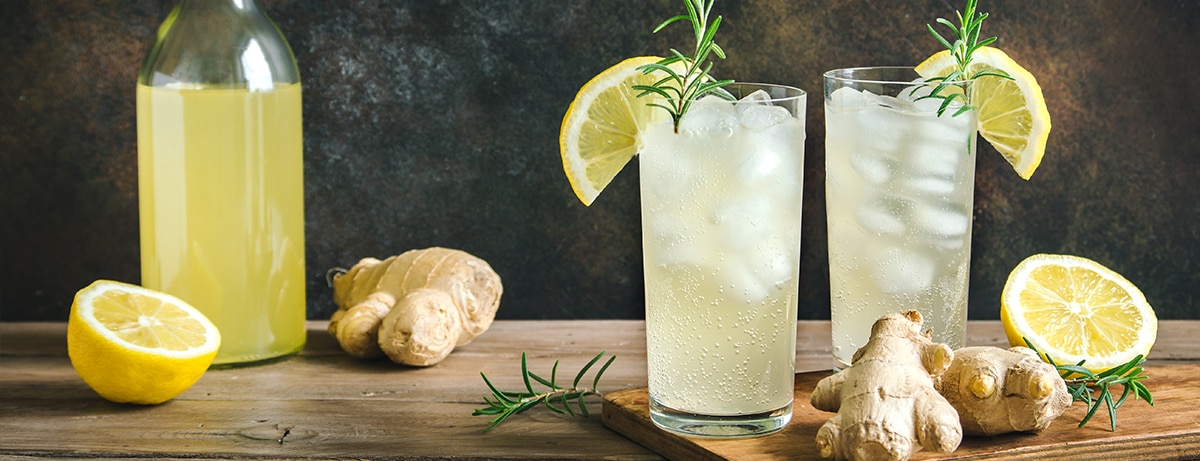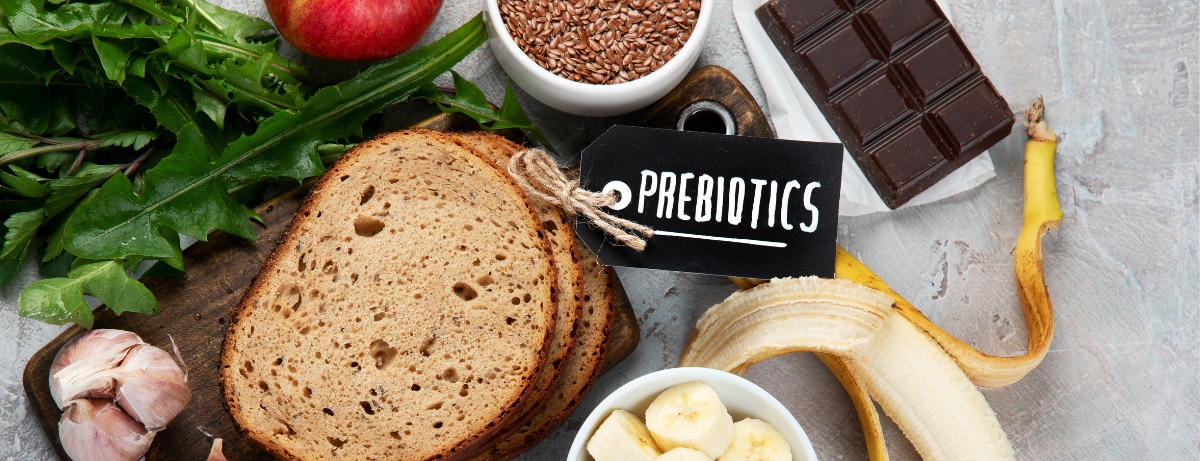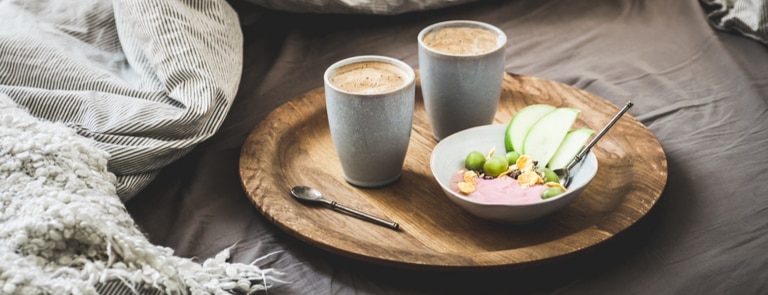20% off €35
Code:QUICK
What is kombucha?

What is kombucha, and is it actually good for you? Kombucha is a great alternative to sugary, fizzy drinks that could benefit your health. Learn more, here.
Summary
1What is kombucha?
Kombucha is a fermented drink made from tea, sugar and a bacterial culture called a SCOBY (symbiotic colony of bacteria and yeast)...
24 benefits of Kombucha
Kombucha has been linked to many potential benefits in many novel upcoming studies, from supporting the good bacteria in your gut to providing...
3Why is kombucha popular?
Fermented drinks have grown in popularity over the past decade as emerging science highlights their potential benefits...
A fermented tea drink with an acidic flavour and slight fizz, kombucha is a delicious drink that we’ve all come to know and love.1 With a lower calorie and sugar content, it's fast becoming a popular alternative to other fizzy drinks.2
Wondering just what makes this fermented drink so popular? Well, there’s growing science that suggests kombucha could hold a whole host of benefits. From its antioxidant content to its diverse bacteria content, here we'll tell you everything you need to know about kombucha.
What is kombucha?
Kombucha is a fermented drink made from tea, sugar and a bacterial culture called a SCOBY (symbiotic colony of bacteria and yeast).1 The fermentation process takes between seven to 14 days.2
Both black and green teas are used to produce kombucha, however, homebrewers generally use black tea, as it ferments faster.2 Black tea varieties typically have a deeper flavour, but some prefer the more delicate taste of green tea kombucha.

4 benefits of Kombucha
Kombucha has been linked to many potential benefits in many novel upcoming studies, from supporting the good bacteria in your gut to providing antioxidants, essential vitamins and minerals, and even helping fight ‘bad’ disease-causing bacteria.1
Here are four potential kombucha benefits and how it may support you in your healthy lifestyle.
1. Kombucha may be good for your gut bacteria
Thanks to its diverse bacteria content, kombucha tea may help to maintain a healthy population of microorganisms in your gut. These bacteria can benefit your stomach and, in turn, your overall wellness.3
Although, not all ‘kombucha’ on the shelves have live cultures or SCOBY, so always read the label before you buy! Either way, it can make a good health swap from regular fizzy drinks.4
Fermented foods are made from bacterial cultures which produce probiotics during fermentation, and kombucha is no exception.1 In fact, most of the potential health benefits of kombucha are thought to be attributed to this cocktail of probiotic microorganisms, amino acids, polyphenols from tea, sugars, organic acids, ethanol, water-soluble vitamins, and a variety of micronutrients produced during fermentation.1
2. Kombucha contains antioxidants
Both green and black tea contain antioxidants called polyphenols, which have been linked to various health effects in emerging research.1
The regular consumption of polyphenol-rich foods may help decrease the incidence of cardiovascular diseases, colon cancer, liver disorders, obesity, and diabetes.5
The exact way polyphenols may cause these effects isn’t widely understood. However, studies have shown that there’s a link between certain polyphenols and their effects on health which warrants further studies.
It’s important to note that there are no particular studies on kombucha, polyphenols, and health, so more detailed research is needed for accurate evidence.
3. Kombucha is jam-packed with vitamins and minerals
Kombucha tea, containing scoby, contains essential vitamins and minerals for your overall health and well-being.
This includes phosphorus, aluminium, magnesium, iron, phosphorus, and sulphur, as well as vitamins B1, B3, B12 and vitamin C. Although, remember not all products labelled ‘kombucha’ will have the scoby so always check the label to get the nutritional information.6,7
4. It's a great alternative to sugar beverages
In today's age, people are choosing kombucha instead of high-calorie, carbonated, sugar-sweetened beverages or alcohol.2
One study of kombucha marketing found that certain types of kombucha were lower in sugar content, and on average contained 64% fewer calories than soft drinks, such as Coke.2 However, kombucha was found to be a lot more expensive, by almost 500%.2
Always double-check the label on your kombucha to check the sugar content, as every product will vary!

Why is kombucha popular?
Fermented drinks have grown in popularity over the past decade as emerging science highlights their potential benefits.1
As people understand more about the link between good gut health and good overall health, kombucha’s popularity will only keep growing. Kombucha is now so popular that Polaris Market Research, a research agency in the US, estimates that $3.63bn was spent on kombucha worldwide in 2023.8
How to make kombucha
The popularity of this fizzy, fermented tea is showing no signs of slowing down. Of course, many pre-bottled options are available, but you could brew your own!
Ready to test the benefits of kombucha or fancy a mini microbiology project? You can follow a simple seven-step kombucha recipe to create a fermented kombucha drink brimming with live bacteria.
What is in kombucha?
Brewing kombucha is easy with the right know-how and ingredients! Kombucha is usually made using five core ingredients. Here is what you'll need to make 1 litre of the drink.
Ingredients:
- 1 litre of cold water. Filter out chlorine first by boiling and allowing it to cool
- 1 bag (or loose tea equivalent) of tea. Black or green tea both work
- 50-100g of sugar. Cane sugar is typically used, with the exact amount to suit your tastebuds
- 1 small kombucha SCOBY. A SCOBY (symbiotic culture of bacteria and yeast) is a disk-shaped culture that creates fizz during fermentation. It’s sometimes also known as a "kombucha mushroom" or "kombucha mother"
- 100ml of a starter tea. This is kombucha reserved from a previous batch to kickstart your new brew. Your SCOBY should come sitting in this liquid
What else you'll need:
- A large glass jar (clear so you can see what's happening.)
Method:
- Put on a brew. Steep the tea and sugar in 250ml of boiled water and leave to cool for six to ten minutes
- Create the right environment for the SCOBY. Remove the tea bag (try not to squeeze it) and add the remaining 750ml of cold de-chlorinated water add the SCOBY and the starter tea. To allow for SCOBY growth and other fermentation effects, make sure to leave at least 5cm of space at the top
- Cover the liquid. Use a cloth, paper towel, and elastic band to prevent dust and fruit flies from getting in. But don't seal the jar as the SCOBY needs to breathe
- Leave for six to nine days. The ideal temperature range for fermentation is 26-27°C. But room temperature should be fine if it's above 21°C. It's better to leave your fermenting kombucha out of a cupboard but avoid direct sunlight
- Start sampling. The exact point when your kombucha is ready depends on your personal taste preference. Some people find it's still too sweet after six days and prefer to wait until nine or 12 days before drinking
- Or you could move on to a secondary fermentation. If you want to add flavours to your brew, if you prefer a higher level of carbonation or are looking to make hard kombucha, you can ferment it further
Kombucha FAQs
Kombucha is a mildly fizzy, fermented cold tea drink with a slightly sour flavour that can be made in various flavours, from refreshing raspberry to ginger and lemon. The origins of the drink are estimated to go back as far as 2000 years.9
But its soaring popularity in recent years in the UK is likely to be down to rising interest in the role of fermented foods in gut health. This has led to pre-bottled versions of this ancient brew becoming more widely available.
Whilst fermentation means that all types of kombucha will contain alcohol, hard kombucha is specifically created to have more significant amounts of alcohol. Typically, hard kombucha is any kombucha that contains over 0.5% ABV.10
The fermentation process used to brew traditional kombucha is repeated to create hard kombucha, with more sugar and yeast added to make it stronger.13
Sometimes, hard kombucha, or alcoholic kombucha, can contain up to 4-7% ABV. In contrast, a non-alcoholic kombucha will hold up to 0.5% ABV, the equivalent of a non-alcoholic beer.13 So, it's worth checking the label on your kombucha to ensure you're drinking the right type!
Whilst kombucha is full of great vitamins, minerals, and healthy bacteria, there are a few things to remember if you are pregnant or breastfeeding.
- All kombucha contains alcohol
- It can be unpasteurised
Pasteurisation is the process of heating products to kill harmful bacteria.
In its purest form, kombucha is unpasteurised, so there’s a risk of it containing some harmful bacteria.2
During pregnancy, it’s often recommended to avoid unpasteurised products to reduce the risk of ingesting harmful bacteria.11
- It contains caffeine
As kombucha is made using green or black tea, it contains caffeine.2 The amount of caffeine found in kombucha can vary, but it should be something to keep in mind.
Some research suggests that kombucha may help you manage your weight.
This is because kombucha contains polyphenols: micronutrients that we get from plant-based foods.7 These micronutrients act as antioxidants to help aid recovery after exercise, support your body in burning fat and help you manage your blood sugar levels.7
The relationship between weight loss and kombucha is still not fully understood, and more research is needed here to provide clear evidence. However, if you’re looking for a sugar-free alternative to your regular fizzy drink, it could be a worthwhile healthy swap!
While the benefits of drinking kombucha tea are great, you shouldn’t drink too much. The Centres for Diseases Control state that 115ml of kombucha, up to three times a day, is safe to drink.12
It’s also important to ensure your kombucha is at the right pH level, especially if you are brewing it at home. There have been reports of people suffering from acidosis caused by drinking too much over fermented Kombucha.13
If you have any queries about whether you should have kombucha, always check with a medical professional as they’ll advise you further.
Some unpleasant side effects are sometimes associated with drinking too much kombucha.
These include:14
- stomach pain
- allergic reaction
- nausea
- dizziness
- headache
Like with any live food or drink, it’s advised to allow your digestive system to adjust by building up the amount you drink gradually. For example, start with a small glass for the first week and increase slowly. Also, it might not suit everyone.
Finally, if you’re pregnant, breastfeeding or have a compromised immune system, kombucha may not be suitable for you so ask your GP before introducing it into your diet.
People with gastric and kidney complaints are more likely to suffer an upset stomach from drinking kombucha than non-sufferers.15
Women who are pregnant or breastfeeding may choose to avoid kombucha because of the alcohol content.13
The final say
Aside from its potential benefits, kombucha can be a refreshing, tasty drink that makes a great alternative to a sugary fizzy drink. What more reasons could you need to start including it in your diet?
The advice in this article is for information only and should not replace medical care. Please check with your GP or healthcare professional before trying any supplements, treatments or remedies.
- Coelho RM, de Almeida AL, do Amaral RQ, da Mota RN, de Sousa PH. Kombucha. International Journal of Gastronomy and Food Science [Internet]. 2020 Dec 1 [cited 2024 Feb 20];22:100272. Available at: https://www.sciencedirect.com/science/article/abs/pii/S1878450X20301499
- Kim J, Adhikari K. Current trends in kombucha: Marketing perspectives and the need for improved sensory research. Beverages [Internet]. 2020 Mar 2 [cited 2024 Feb 20];6(1):15. Available at: https://www.mdpi.com/2306-5710/6/1/15
- Aparecida M, Larissa D, Gabriela Macedo Fraiz, Isabelle Lima Lopes, Iris A, Vidigal C, et al. Effect of kombucha intake on the gut microbiota and obesity-related comorbidities: A systematic review. Critical reviews in food science and nutrition [Internet]. 2021 Oct 26 [cited 2024 May 14];63(19):3851–66. Available from: https://pubmed.ncbi.nlm.nih.gov/34698580/
- Ferreira J, Larissa Fernandes Ruiz, Cíntia Borges Silva, Thais Matsue Uekane, Kelly Alencar Silva, Gonçalves A, et al. Kombucha: A review of substrates, regulations, composition, and biological properties. Journal of food science [Internet]. 2022 Jan 14 [cited 2024 May 14];87(2):503–27. Available from: https://ift.onlinelibrary.wiley.com/doi/full/10.1111/1750-3841.16029
- Rasouli H, Farzaei MH, Khodarahmi R. Polyphenols and their benefits: A review. International Journal of Food Properties [Internet]. 2017 Dec 29 [cited 2024 Feb 20];20(sup2):1700-41. Available at: https://www.tandfonline.com/doi/full/10.1080/10942912.2017.1354017
- Kluz MI, Pietrzyk K, Pastuszczak M, Kacaniova M, Kita A, Kapusta I, Zaguła G, Zagrobelna E, Struś K, Marciniak-Lukasiak K, Stanek-Tarkowska J. Microbiological and physicochemical composition of various types of homemade kombucha beverages using alternative kinds of sugars. Foods [Internet]. 2022 May 23 [cited 2024 Feb 20];11(10):1523. Available at: https://www.mdpi.com/2304-8158/11/10/1523
- Nurikasari M, Puspitasari Y, Siwi RP. Characterization and analysis kombucha tea antioxidant activity based on long fermentation as a beverage functional. Journal of Global Research in Public Health [Internet]. 2017 [cited 2024 Feb 20];2(2):90-6. Available at: https://www.jgrph.org/index.php/JGRPH/article/view/109
- Market P. Global Kombucha Market Trends & Growth, Forecast 2024-2032 [Internet]. Polaris. 2024 [cited 2024 Jun 18]. Available from: https://www.polarismarketresearch.com/industry-analysis/kombucha-market
- Nyhan LM, Lynch KM, Sahin AW, Arendt EK. Advances in kombucha tea fermentation: A review. Applied Microbiology [Internet]. 2022 Jan 15 [cited 2024 Feb 20];2(1):73-103. Available at: https://www.mdpi.com/2673-8007/2/1/5
- Harrison K, Navarro R, Jensen K, Cayler W, Nielsen T, Curtin C. Live, Probiotic, or Neither? Microbial Composition of Retail-Available Kombucha and “Hard” Kombucha in the Pacific Northwest of the United States. Beverages [Internet]. 2023 Jul 11 [cited 2024 Feb 20];9(3):59. Available at: https://www.mdpi.com/2306-5710/9/3/59
- NHS. Foods to avoid in pregnancy [Internet]. nhs.uk. 2020 [cited 2024 Feb 20]. Available from: https://www.nhs.uk/pregnancy/keeping-well/foods-to-avoid/
- Jakubczyk K, Kałduńska J, Kochman J, Janda K. Chemical profile and antioxidant activity of the kombucha beverage derived from white, green, black and red tea. Antioxidants [Internet]. 2020 May 22 [cited 2024 Feb 20];9(5):447. Available at: https://www.mdpi.com/2076-3921/9/5/447
- Hammel R, Karakilic V, Shaw F. The affect of temperature and pH on the food safety of kombucha tea. BCIT Environmental Public Health Journal [Internet]. 2016 Mar 2 [cited 2024 Feb 20]. Available at: https://journals.bcit.ca/index.php/ehj/article/view/91
- Țacu Ș, Jude C, Moiș E, Deleanu D. A Review of side effects of Kombucha. Archives of Clinical Gastroenterology [Internet]. 2023 Jun 1 [cited 2024 Feb 20];9(2):008-11. Available at: https://www.peertechzpublications.org/articles/ACG-9-217.php
- SungHee Kole A, Jones HD, Christensen R, Gladstein J. A case of Kombucha tea toxicity. Journal of Intensive Care Medicine [Internet]. 2009 May [cited 2024 Feb 20];24(3):205-7. Available at: https://journals.sagepub.com/doi/10.1177/0885066609332963



